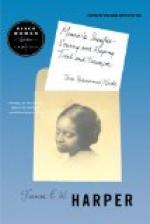“Well, so she was. She was quite light, but I knew she was colored.”
“How did you know? Maybe she was only a very dark-complexioned white woman.”
“Oh no, she wasn’t, I know white people from colored, I’ve seen enough of them.”
“A colored woman! well that is very strange; but do tell us what Minnie said.”
“She asked her where she came from, and where she lived. She said she came in yesterday with the Union soldiers, and that she had come from Louisiana, and then Minnie told her to come with her, and she would find a place for her to stop.”
“And did she leave you in the street to walk with a Nigger?” said a coarse, rough-looking girl.
“Yes, and so I left her. I wasn’t going to walk down the street with them!”
“Well, did I ever?” said a pale and interesting-looking girl.
“That is just as strange as a romance I have been reading!”
“Well, they say truth is stranger than fiction. A deceitful thing to try to pass for white when she is colored! If she comes back to this school I shan’t stay!” said the coarse rough girl, twirling her gold pencil. “I ain’t a going to sit alongside of niggers.”
“How you talk! I don’t see that if the woman is Minnie’s mother, and is colored, it makes any difference in her. I am sure it does not to me,” said one of Minnie’s friends.
“Well, it does to me,” said another; “you may put yourself on an equality with niggers, but I won’t.” “And I neither,” chimed in another voice. “There are plenty of colored schools; let her go to them.”
“Oh, girls, I think it real cruel the way you talk!”
“How would you like any one to treat you so?” “Can’t help it, I ain’t a coming to school with a nigger.” “She is just as good as you are, Mary Patuck, and a great deal smarter.” “I don’t care, she’s a nigger, and that’s enough for me.”
And so the sentiment of the school was divided. Some were in favor of treating her just as well as usual, and others felt like complaining to their parents that a Negro was in school.
At last the news reached the teacher, and he, poor, weak, and vacillating man, had not manhood enough to defend her, but acted according to the prejudices of society, and wrote Thomas a note telling him that circumstances made it desirable that she should not again come to school.
In the meantime the news had reached their quiet little village, and of course it offered food for gossip; it was discussed over tea-tables and in the sewing circle. Some concluded that Thomas should have brought her up among the colored people, and others that he did perfectly right.
Still there was a change in Minnie’s social relations. Some were just as kind as ever. Others grew distant, and some avoided having anything to say to her, and stopped visiting the house. Anna and Thomas, although superior people, were human, and could not help feeling the difference, but some business of importance connected with the death of a relative called Thomas abroad, and he made up his mind that he would take Anna and Minnie with him, hoping that the voyage and change of scene would be beneficial to his little girl, as he still called Minnie, and so on a bright and beautiful morning in the spring of ’62 he left the country for a journey to England and the Continent.




